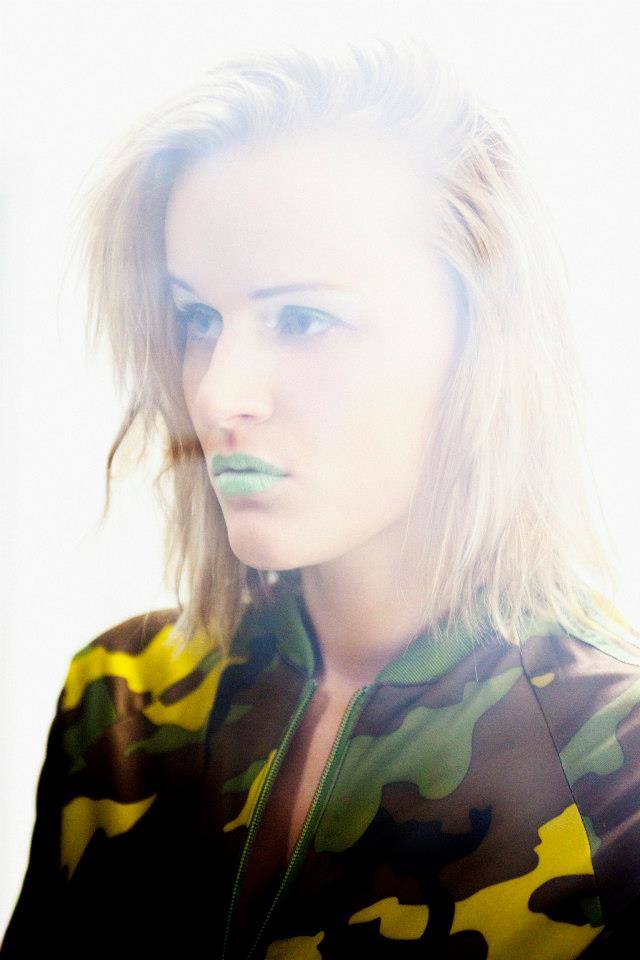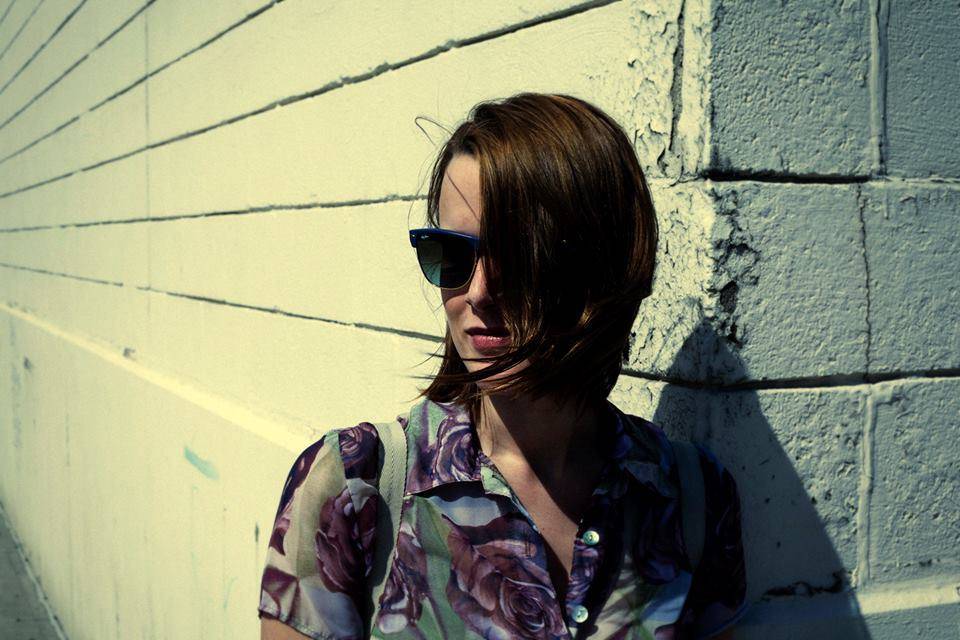Maria Minerva, who released her fourth LP, Histrionic, last year and won the titles of the Best Female Artist and the Best Electronic Album at the Estonian Music Awards in February, is one of the few phenomena from Estonian soil who has emerged to the top of the global alternative music scene.
By Mariliis Mõttus
Since 2011, her music has found its home under the roof of a Los Angeles-based record label Not Not Fun and its offshoot, 100% SILK, whose artists (Torn Hawk, Sapphire Slows, Jonas Reinhardt, to mention a few) can be found experimenting with rock, house and dub, but the signature sounds of the label are romantic noise, quirky pop and colourful-psychedelic undulations that also become visible on the album/cassette covers. All of this and more is represented in Minerva’s music as well, and this kaleidoscope of sounds is also characteristic to the winning Histrionic, according to many critics her best album yet.
You have lived in Lisbon, London and now in the US. As a bystander, how would you evaluate the current state of Estonian music scene? Do we still have a long way to go, in comparison with other countries?
Estonia just is small and we have little contact with the world outside, which is a shame. I’ve got the feeling there’s more cultural exchange between Finland, the Baltics and Russia. But the everlasting question everyone always tends to discuss is still, “how can we get Estonian music out of Estonia?” I cannot answer this, because it happened in sort of an X-course for me. I just started my studies in university in London and things went on by themselves after that. It seems to me there’s a network between the big cities like London, LA, New York and Berlin, and this network consists of young musicians and music journalists, but all the others are out of this communication. This group creates things that often become quite huge, and some of them actually reach semi-mainstream. For example FKA twigs. Maybe the first step could be moving abroad and finding out if you can become part of the network. This is a very complicated question, but the problem with Estonia is the fact that we’re out of the focus.
You moved from New York to Los Angeles a little while ago. Why did you decide to do that?
It’s a pretty common tendency that people move between these two cities. It has always been like that, but more towards LA, because life has become too expensive on the east coast. I actually think the once-famous New York does not exist anymore, and I don’t really like this metropolitan vibe. I rather sit here in LA, where you feel like you’re in a small town and the sun shines all the time. It cannot compete with New York as a city, but it doesn’t really matter to me, because I have seen my share of big cities. I just had enough of the fast pace of life and being squeezed between people in the subway. And the fact that rent for one room is around a thousand dollars in New York is a bit too much.
What is the everyday life like for a musician in LA?
I haven’t been able to settle in yet, but there’s nothing special. Most of the people have a daytime job and all the other things are done beside that. Young art or music people, who I know, are doing several things at once, because it’s hard to live just from art and there are no organizations that give money away just like that. Everything comes from your own initiative. But I’m not afraid of the thought of getting a job. It’s a good thing that I can do it in the first place as a new owner of the so-called green card of the extraordinary abilities, as my documents are OK. Secondly, I think that this helps me to get to know the city a bit better. I was scared, for example, when I moved to LA and didn’t know how I would make a living. At that point I only had a temporary visa and felt like a Mexican immigrant who had just jumped over the US border, not knowing what tomorrow will bring (laughs). Luckily, “tomorrow” brought me a residence permit.
Bringing up the topic of the so-called “comfortable emigration”, as it has been referred to in Estonia, how would you comment on this term from your own experience?
Well, there’s nothing comfortable in here. Estonia is in every way a much more organised country than the US. My mother’s mouth dropped open when she heard this. When you’re in Estonia, everything seems to be really bad and you’d like to complain and whine all the time, but living in the US for more than two years has taught me that life in Estonia is really good. If you’re working, doing something or at least register yourself as unemployed, they create an opportunity for you in Estonia. Even the fact that we have a chance to get free education, is in my opinion the biggest thing in the world. I don’t dare to have children in the US anytime soon, because I have to manage myself and the state is not helping you at all. You have around seven days off in a year, no maternity pay, just have a child and see for yourself how you can cope. Every person stands up for themselves in here. As long as I’m young, I’m ready to make an effort,
You have mentioned that your latest album Histrionic is influenced by Vagina: A New Biography, a book by a feminist writer Naomi Wolf. Can you explain this connection?
 This book accidentally ended up in my hands. I wasn’t her fan before, but I heard a review about this on the radio and started to read. There’s no direct connection between the album and the book – that Histrionic has been built up on the book’s motive. I was just haunted by the idea that the world experience of women has been dissatisfactory throughout the history, not only sexually but in general, and how much this has been kept quiet. Wolf, however, talks about the sexual aspect. It’s basically like a public secret. I’ve always felt – especially when you’re a little more independent or determined – that there’s plenty of freedom in this western model to where you are born, but there’s also a lot of frustration or unanswered prayers. There was this joy of recognition about this book – that I’m not alone with these thoughts. This all sounded very familiar to me and those thoughts stayed with me for a long time. I understood that one woman has written down how we have felt for a long time. As I was working on my album at the same time, it definitely influenced me. I have been dealing a lot with women’s issues – it’s not that direct in the sense of my music, but as a thinking person, yes, all the time. Now maybe less, because I’ve thought about these things so much already, but it inevitably goes hand in hand with our everyday life.
This book accidentally ended up in my hands. I wasn’t her fan before, but I heard a review about this on the radio and started to read. There’s no direct connection between the album and the book – that Histrionic has been built up on the book’s motive. I was just haunted by the idea that the world experience of women has been dissatisfactory throughout the history, not only sexually but in general, and how much this has been kept quiet. Wolf, however, talks about the sexual aspect. It’s basically like a public secret. I’ve always felt – especially when you’re a little more independent or determined – that there’s plenty of freedom in this western model to where you are born, but there’s also a lot of frustration or unanswered prayers. There was this joy of recognition about this book – that I’m not alone with these thoughts. This all sounded very familiar to me and those thoughts stayed with me for a long time. I understood that one woman has written down how we have felt for a long time. As I was working on my album at the same time, it definitely influenced me. I have been dealing a lot with women’s issues – it’s not that direct in the sense of my music, but as a thinking person, yes, all the time. Now maybe less, because I’ve thought about these things so much already, but it inevitably goes hand in hand with our everyday life.
Do you consider yourself a feminist?
It depends on how you define this term. There’s no end to these definitions. My ultimate goal has always been total independence or doing my own thing, and that I have accomplished. Let’s just start by these simple things like relationship with my father. I, for example, felt that Estonia is too small and it’s important to leave for not be outshined by my father (Maria’s father is a well-known satirist in Estonia – M.M.). We’ve always had very good relations, but I just think that I as an individual want to take myself out of the equation. The attitudes he has given me, have definitely helped me a lot while travelling alone in the world, but the fact who he is has not played a role in the US – no one knows anything about my family. This is very liberating.
In your lyrics you’ve used, for example, Comte de Lautréamont’s poetry, hints at French feminist and writer Hélène Cixous and at the movie The Beach. What do these references mean to you? Is the ordinary lyric writing process too boring?
My ordinary lyric writing process actually is very boring, but these are just things from here and there which somehow matter to me and which I integrate to what I do. I like absolutely everything that’s fascinating, and it doesn’t only have to be decadent French poetry (laughs). Maybe it’s even a bit better when you don’t know what it is, as it’s not so pretentious then. It’s always nice when there are little hints hidden somewhere. I like doing that, and I like when others do that. For example, I’m now reading Naomi Klein’s book about global warming, but I’m probably not going to write an anthem to environment (laughs). It’s often so that you read a book that doesn’t have anything to do with your creation, but there’s a heading, a sentence or an expression that keeps buzzing in your head. This happens all the time.
Lately I’ve watched more movies, although it might be something to do with travelling and the fact that I have too much useless time because of that. As a matter of fact, I’ve been watching these mainstream films that have received many awards recently, but none of them has actually brought upon any particular feelings. After that I watched some classics and they acquired a totally different dimension. For example, Brian De Palma’s Scarface (laughs). I thought, “god damn it, this is a damn good movie”. The music is totally bizarre and doesn’t go together with the movie at all. Now that I’m a new immigrant in the US, I like to watch those movies where immigrants come and cause some trouble. It’s also really nice to go back to the old favourites which are not such a daily issue anymore and which in your opinion have a really cool nuance. I think there’s too much talking about the same things and consuming the same culture. It’s really nice when there’s a discussion, but I feel like there’s already too many opinions on the internet. I often don’t want to be a part of it and go back to my stupid thing.
You’ve been creating music very intensely for the past four years and studied art theory at the same time. How’s with inspiration when you’re doing so many things simultaneously? Do you have to force yourself or does it come automatically?
Both. First I have to force myself and then it comes automatically. Lately I’ve been using the word “to concentrate” a lot. I don’t know if it’s because of the smartphones or the endless travelling, but I feel that it’s harder and harder to concentrate. Maybe my mind has become weaker with age, but at the same time it feels that it’s not only my problem, because everybody I speak to complain about the same thing. It has been sort of a constant motive in my life for the last couple of years. Even the fact that I cannot concentrate on the current moment or to where I currently am: when I was in London, I wanted to be in LA, when I was in Estonia, I wanted to be in London. That’s why I’m so glad that I’ve found a chill place where it’s physically easier to be and good to quietly do your own thing. There’s no urban chaos. The only place where you can see people is when you’re in a traffic jam on a highway. I’ve no intention of becoming some kind of a new age person here in LA, but there’s a huge difference whether you’re going out in a storm or sunshine. I physically want to be at a point where I feel that I can do something.
What does your musical future bring?
I want to organise my own DJ-night. I tried to do it last year, but then I left the country again. You have to arrange your own entertainment in here. I was just in London and was so happy that I could take part in the dance music there, as it is something that really speaks to me. Futuristic and prospicient. There’s nothing like that in LA. You can hear ultra-modern dance music in London, while you can only hear Katy Perry’s singing from the cars in here. I don’t really feel like going out anymore, which is very weird. I mean, I could, and I think there are things going on in here, but it doesn’t feel like that. It’s more like this singer-songwriter moaning. I like completely different things about LA, things that are not related with the music scene. In fact I came here to be in warm, concentrate and to settle in, because there was a party, an event or a concert every week in New York, and life there was really hectic overall. You either party too much or work too much. I didn’t like that. It’s a bit cosier in LA and you can combine and do little projects.
Projects with some local artists perhaps?
It’s a bit early to talk about cooperation, because it’s often so that you make plans but they don’t come to life. Right now I’d like to make some dance music together with my friend, so maybe I’ll do it in February. Those one-time jam-sessions come around every now and then, and they keep your mind fresh. In this sense it’s good to be in LA – there are so many different music industry events. I am planning on going to a few workshops or conferences about song writing. That’s the thing that interests me the most right now. When it comes to my next album, then I don’t have any plans, because I released two to three albums in the past three years, so I feel like I’m a bit burned out. I write music every day, but I want to polish my technical skills, so the next things would come out in 2016 or 2017. I’m not retiring, but the music award was also this little treat which showed me that I have been noticed in Estonia, and that’s really nice. However, I’m now sitting in LA and I have other ambitions. I don’t want to be an underground or indie musician, but I rather wish to find my own place in here. It definitely means several things: I either have to make new connections, slave for someone or send out demos again. Basically start from the scratch.
That’s what’s interesting about America – no one cares who you are and where you come from. Music has always been my number one priority, but I feel that I cannot continue in the same way. There has to be a reason why I got here. I for sure have to take everything out of this opportunity, but it’s not entirely out of question that I’ll come back to Estonia if my plans should go down the drain. At one time in my life I had this feeling that I have no other choice but to always live abroad. Now that I’ve been to Estonia the last couple of times, I feel that it’s really nice to be there and I believe that I could definitely find a use for my experience. I just have to figure out what’s the best place for me. There has been such a huge battle for the residence permits and apartments that I simply cannot go back next year. Let’s just wait and see what happens next.
I
This article was first published by Wader. Photos courtesy of Maria Minerva.




